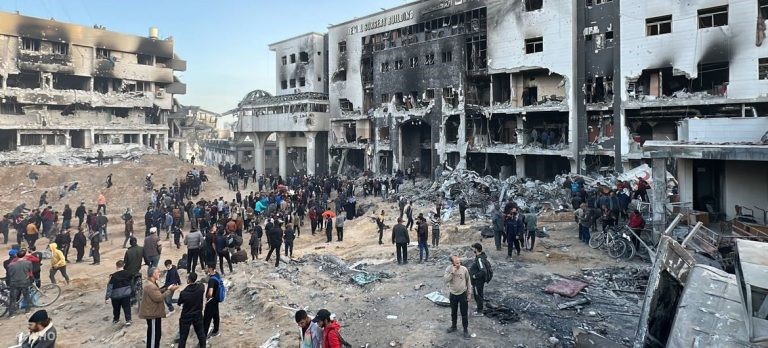
The United Nations Security Council called Friday for an immediate independent investigation into mass graves allegedly containing hundreds of bodies near hospitals in Gaza. Members of the council expressed in a statement their “deep concern over reports of the discovery of mass graves, in and around the Nasser and Shifa medical facilities in Gaza, where several hundred bodies, including women, children and older persons, were buried.”
New York, N.Y. They stressed the need for “accountability” for any violations of international law and urged that investigators be given “unimpeded access to all locations of mass graves in Gaza to conduct immediate, independent, thorough, comprehensive, transparent and impartial investigations.”
Israel has repeatedly struck hospitals in Gaza since the beginning of its military operation in the enclave, which was prompted by an October 7 attack on Israeli residential communities and a music festival by Hamas militants.

Israel has accused Hamas of using these medical facilities as command centers and in some instances as places where it held hostages abducted during Hamas’ October 7 attack.
The World Health Organization said in April that Gaza City’s Shifa Hospital had been reduced to an “empty shell,” with many bodies found in the area.
The Israeli army has said around 200 Palestinians were killed during its military operations there.
The U.N. rights office called last month for an independent investigation into reports of mass graves at Shifa and the Nasser Medical Complex in Khan Yunis.
Rafah exodus
The U.N. says about 110,000 people have fled the southern Gaza city of Rafah as of Friday, amid fighting between Israeli forces and Hamas militants, along with Israeli bombardments that have increased in and around the city.
Meanwhile, cease-fire talks brokered by Qatar and Egypt are back to square one, Hamas said Friday, accusing Israel of rejecting a truce proposal written by the mediators.
Negotiators for Israel and Hamas left Cairo late Thursday, ending the latest round of indirect negotiations.
National Security Council spokesperson John Kirby on Friday called the development “deeply regrettable.” The U.S., Qatar and Egypt were mediating the talks.
“We are working hard to keep both sides engaged in continuing the discussion, if only virtually,” he said.
While a full-scale invasion of Rafah does not appear to be imminent, the more limited incursion launched earlier this week is continuing.
Speaking Friday at a press conference in Nairobi, U.N. Secretary-General Antonio Guterres once again appealed to both Israel and the Hamas leadership to “demonstrate political courage and spare no effort to reach an agreement to stop the bloodshed and to free the hostages.”
He described the situation in Rafah as being “on a knife’s edge” as airstrikes continued throughout southern Gaza. More than 1 million Palestinians, half of whom are children, have crowded into the Rafah governorate for shelter.
At a news briefing earlier Friday, the head of the U.N. Gaza Office for the Coordination of Humanitarian Affairs, or OCHA, Georgios Petropoulos, said the fighting surrounding Rafah is exacerbating the humanitarian crisis in Gaza.
Speaking remotely, Petropoulos said all crossings into the Rafah area in southern Gaza are closed, preventing movement of supplies, humanitarian staff or any civilians needing to evacuate. He said even if the Rafah crossing was open, the nearby fighting would make it too dangerous to use.
The OCHA chief said unless there is a solution quickly, humanitarian activities will come to a halt in Gaza “within the next two days.”
The Gaza Health Ministry, which is controlled by Hamas, said Friday that 34,654 Palestinians have been killed and 77,908 injured since Israel’s military offensive on Gaza began in October after the Hamas terror attack on October 7.
The White House on Thursday once again warned Israel against expanding its limited operation into an all-out assault on Rafah, this time not only for long-held humanitarian concerns but for strategic calculations.
Kirby told reporters, “Our view is that Rafah operations, certainly any kind of major Rafah ground operation, would actually strengthen Hamas’ hands at the negotiating table, not Israel’s.”
He said that Yahya Sinwar, the Hamas leader currently believed to be hiding in the network of tunnels in Gaza, would have “less incentive to want to come to the negotiating table” if there were massive new civilian casualties in Rafah.
But Israeli Prime Minister Benjamin Netanyahu remained defiant, saying Israel is prepared to “stand alone” against its enemies. In a later interview on U.S. television, Netanyahu said he hoped that he and Biden could overcome their disagreements.
Netanyahu ordered Israeli forces to carry out a “limited operation” in eastern Rafah earlier this week after rejecting a proposed cease-fire deal that Hamas said it had agreed to. The deal would have provided a temporary pause in hostilities paired with the release of hostages held by Hamas in exchange for Palestinians detained in Israeli jails.
State Department spokesperson Matthew Miller told reporters Thursday that negotiators are still working to make changes to Hamas’ counterproposal, but finalizing the agreement’s text was an “incredibly difficult” process.
Israeli Foreign Minister Israel Katz said Thursday that his country’s military “will continue to fight Hamas until its destruction.”